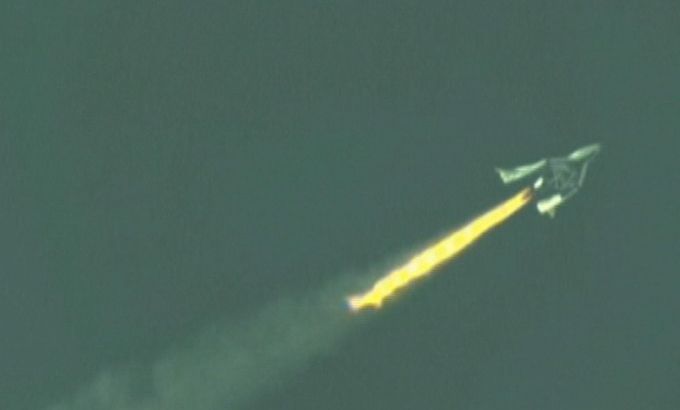Virgin Galactic test flight goes supersonic
California test reaches Mach 1.2 as engines fire for 16 seconds before gliding back to the ground.

A six-passenger spaceship owned by an offshoot of the Virgin Group has fired its rocket engines in flight for the first time.
Monday’s test, which saw the SpaceShipTwo’s engines burn for 16 seconds, was a key step towards a commercial Virgin Galactic flight within the next year.
“It was stunning,” Richard Branson, founder and chairman of the Virgin Group, told the Reuters news agency.
“You could see it very, very clearly. Putting the rocket and the spaceship together and seeing it perform safely, it was a critical day.”
The spaceship and its carrier aircraft, WhiteKnightTwo, took off from the Mojave Air and Space Port at 7 am local time (1400 GMT), heading to an altitude of about 14 kilometres, where SpaceShipTwo was released.
Two pilots then ignited the ship’s rocket engine and climbed another three kilometres, reaching Mach 1.2 in the process.
Additional test flights are planned before the spaceship will fly even faster, eventually reaching altitudes that exceed 100 kilometres.
“Going from Mach 1 to Mach 4 is relatively easy, but obviously we’ve still got to do it. I think that the big, difficult milestones are all behind us,” Branson said.
Sky high prices
Virgin Galactic is selling rides aboard SpaceShipTwo for $200,000 per person.
More than 500 people have put down deposits.
Branson and his grown children plan to be the first non-test pilots to ride in the spacecraft, about a year from now.
SpaceShipTwo is based on a three-person prototype called SpaceShipOne, which in October 2004 clinched the $10m Ansari X Prize for the first privately funded human spaceflights.
Paul Allen, co-founder of Microsoft, bankrolled SpaceShipOne’s development, estimated at $25m.
The company plans to build four more spaceships and several WhiteKnight carrier jets, which also will be used for a
satellite-launching business.
In addition to flying passengers, Virgin Galactic is marketing SpaceShipTwo to research organisations, including
NASA, to fly experiments, with or without scientists.
Other companies planning to offer suborbital spaceflight service include privately owned XCOR Aerospace, which expects to begin test flights of its two-person Lynx rocket plane this year.